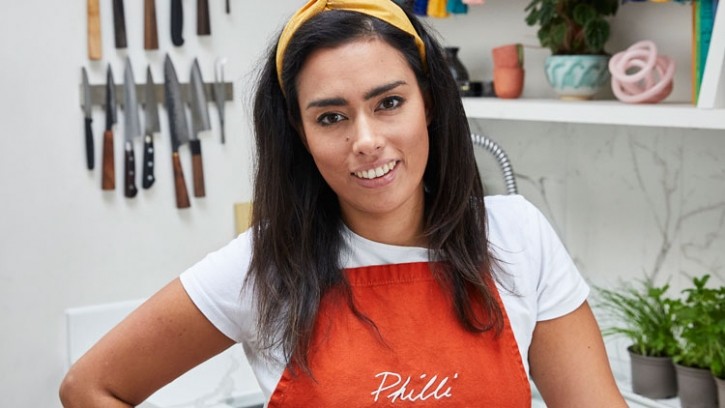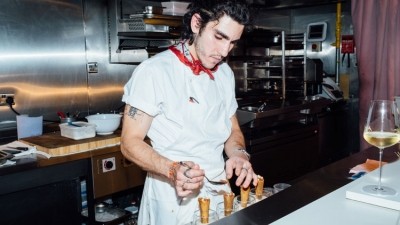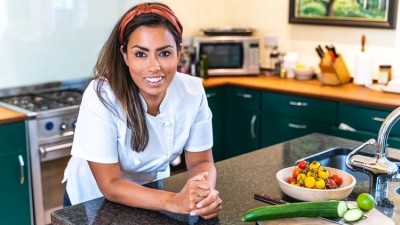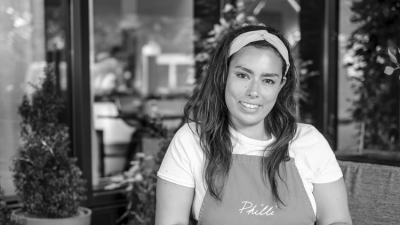Philli Armitage-Mattin: "I know how to chop and chat"

What’s it like to cook in a restaurant with no plates or cutlery?
I’m loving it. I am a big fan of Kebab Queen anyway. It's a hidden gem in London serving the sort of food I want to eat. Manu (the Covent Garden restaurant’s chef patron) needed a break and asked me if I wanted to step in. They actually interviewed a few other chefs and we all did trial dinners. Happily I was their first pick. It's exactly the sort of setup I would want in my own restaurant because the cooking style has to be very playful and I get to interact with the guests.
It looks like you're enjoying the social nature of Kebab Queen…
Yes. I've done TV and social media stuff so I know how to chop and chat. Some chefs can be quite robotic. If you can be relaxed and personable it adds to the experience. I'm more than happy to chat away, but equally if someone just wants to get on with their dinner that's fine too.
What’s the uptake been like?
Great. We’re nearly fully booked in the evenings for the first month of our three-month run. It's 12 covers five services a week. We're open Tuesday to Friday in the evenings and for lunch on Friday (offering a shorter menu). It's good for work-life balance. My boyfriend and I have been able to go away for weekend breaks, which is quite a novelty for a chef that has just launched a restaurant.
Tell us about your menu at Kebab Queen
We’re offering a similar number of courses but we’re not serving any kebabs or takes on kebabs. My cooking style is different to Manu’s but we both like big flavours and cook the sort of dishes that people crave. Most of my dishes have a strong Asian influence. Some of the key ones on the menu are aged beef in a taco made from pickled turnip; a summer roll filled with grilled monkfish and fresh herbs served with a tahini made with sunflower seeds; and a multi-element lamb dish that is inspired by the flavours of the Chinese province of Shaanxi. I don't ever want to be stagnant. The menu will continue to evolve over the course of the residency. That's the beauty of a menu like this, we can change it every day if we want to.
Tell us about your background
I've always loved cooking despite neither of my parents having had much interest in it. People often say 'you're half Indian, you must have got the cooking bug from your mum' but that wasn't the case. She loved a shortcut in the kitchen. I took an academic route initially, partially because my parents were keen for me to get a 'normal' job. While I was studying for my masters in chemistry in Bristol I went to a lecture by Peter Barham (a food scientist). I didn't realise you could look at food at a molecular level. Around that time I was taken to L'Enclume. It was my first fancy meal and I was blown away. Chet Sharma (now chef patron of progressive Indian restaurant Bibi) was working there at the time and he showed me around the development kitchen. It looked like my chemistry lab at uni. I thought he was the coolest person on earth so I asked 'how can I be you?'. I had the science bit but I needed the professional cooking bit, so I started working in restaurants.
Where did you work?
I worked at Maze and at London House. I chose Gordon Ramsay Group because I wanted to learn a lot in a short amount of time, and it seemed like the place to do that. That was certainly the case - you are dropped in at the deep end and you sink or swim. Luckily I swam; I was there for a while. I was a lower-level chef, which means you are effectively a machine. I wanted to do something more creative, so I went off to work for Tesco developing ready meals.
What was working for Tesco like?
It sounds very unsexy but I absolutely loved it and learnt a lot. It combined my love of chemistry and food. We had to think carefully about scaling things up - what happens when you scale something up from 2kg to two tonnes? We worked on everything from Indian to Italian meals to Christmas and vegan ranges. We developed the Wicked kitchen range in 2018 before veganism was a big category in supermarkets. After that I spent a year or so travelling around Asia eating and cooking.
Where did you go?
I started out in Japan and ended up in Indonesia. I did a small stint in high-end restaurants including Tokyo's Den (which is on the World's 50 Best Restaurants list). While the food in Japan was incredible and I loved it, I found regional Chinese food even more exciting especially having grown up eating Anglo Chinese food - I thought it was just orange chicken balls. I was wowed by Chinese food in every region that I went to, especially the Muslim cuisine in Shaanxi Province.
What's the plan after Kebab Queen? Are you gearing up to launch your own place?
Maybe. This a great platform for me to find out whether I love being in the business. Once you open a restaurant, you're just there. That scares me because I like to constantly do new things and have new experiences. But I do have an idea to do something a bit like Kitchen Table when the site also included Bubbledogs. It would be a rubbish-looking chicken shop (one of Armitage-Mattin's signature dishes is PFC, Philly Fried Chicken) with something more high-end hidden away in the back or upstairs. But I’d only want to do it if it was perfect. I’ve already released a cookbook, I’m pitching for a TV series at the moment and I’m also trying to build my presence on social media. I’m aware that I’ll probably end up with more money and more time if I don’t open a restaurant.




















